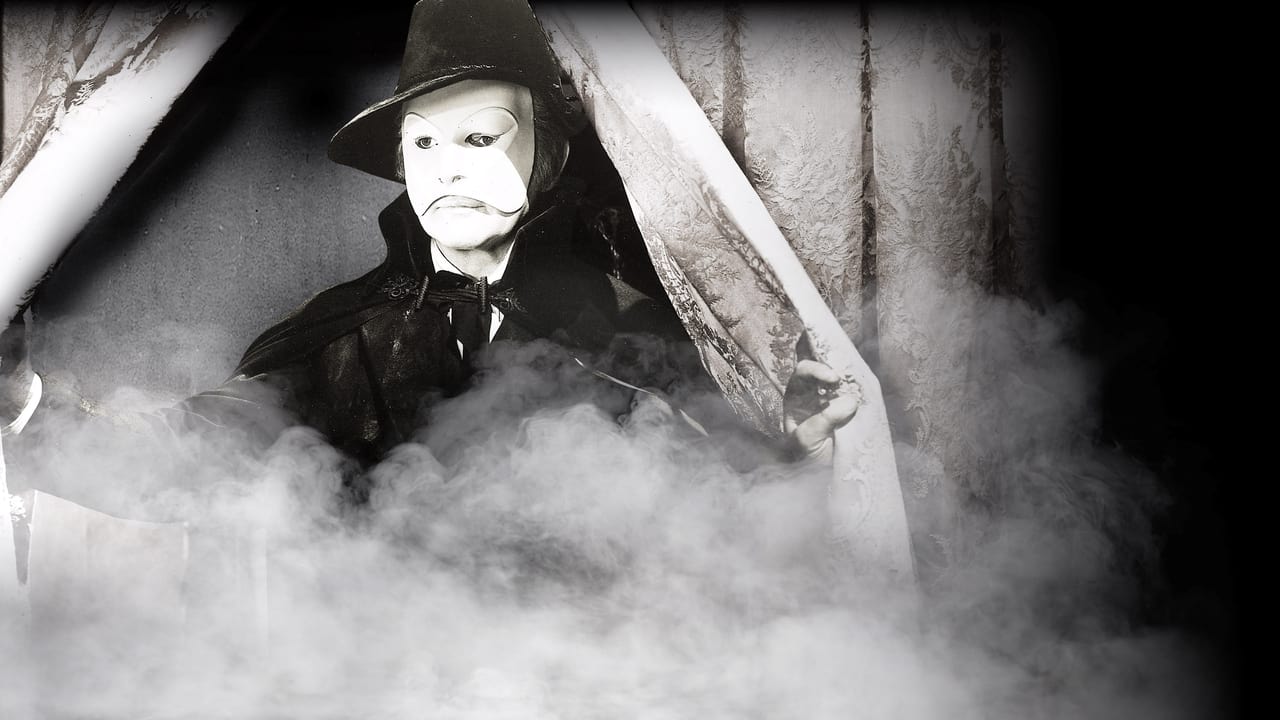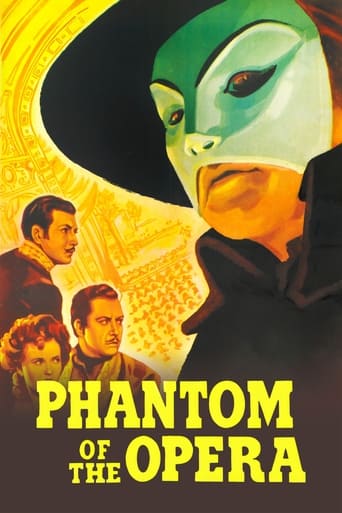



the audience applauded
Dreadfully Boring
The performances transcend the film's tropes, grounding it in characters that feel more complete than this subgenre often produces.
View MoreGreat movie. Not sure what people expected but I found it highly entertaining.
View MoreI can't help but compare this to Chaney's silent classic, and it just plain doesn't hold up. Completely lacking in the Gothic, macabre visuals of that one, it instead leans into the phantom's romantic origin story, and it's just not that engaging. The tone is all over the place, with a few cool moments of tension breaking the doldrums (chandelier, use of shadow).
View MoreEven though I have never read the book, I have always been fascinated by the story and the characters of The Phantom of the Opera. I've seen the 2004 adaptation (which is a fairly decent film in my opinion) and I tried to watch the 1925 version with Lon Chaney but found it to be a bit boring even for my tastes. Now, when it comes to this film...I feel as though the 1943 Phantom of the Opera falls swiftly in between the two extremes. It is neither a "true" musical, (the only musical parts being the actual performances on the opera stage) nor is it a "horror" film like it's silent predecessor. Rather, it is a melodrama centering around a gorgeous, talented young Opera singer(Susanna Foster), her two suitors and a meek, lonely violinist who becomes our mysterious, brooding Phantom. (Claude Rains.)What makes his performance in particularly interesting, is that unlike Chaney, or even Butler's version of the masked opera ghost....Claude Rains gives us a Phantom that is all too human. Perhaps this is meant to symbolize that anyone can become a "phantom" if they are pushed to their limits, as opposed to some mysterious monster who we cannot relate to whatsoever. In this adaptation, the phantom is not born with his deformity. Rather, it is an unfortunate consequence of his own actions and wrong doings, which I thought was a very interesting alteration of the plot.It's obvious that Rains' performance as a man-turned-monster is the highlight of the film. But it has more saving graces than I initially expected. The vocal talents of Susanna Foster and Nelson Eddy are marvellous to say the least. And the spectacles of the Opera performances themselves are very pleasing to the eyes and ears. There are several charming comedic moments between Christine and her two suitors who are constantly competing for her affection. The cinematography is also quite brilliant. Establishing shots effectively show the Opera house's splendour from all of the best angles and are used very effectively. However, by far one of the best things of this film is it's soundtrack. It's beautiful, tragic and sad all at once. Particularly the "Lullaby of the Bells", which is a reoccurring theme.Overall, this film exceeded my expectations. It's certainly no "horror" masterpiece like the Lon Chaney version. Nor is it a noble blockbuster as the 2004 adaptation. It's an interesting and unique interpretation of the story with a great performance from Claude Rains. It does show it's age but if you enjoy classic musicals at all, then you will certainly be able to appreciate it.
View More(55%) A more light-hearted horror from universal featuring large amounts of dubbed-in opera performances and some romantic comedy, although I've learnt that some of the actors were in fact more than able singers. I doubt this was ever considered to be that scary, and these days it's very tame owing mainly I'm guessing to the fact that most people living through the second world war wanted to get away from fictional horror because so much real horror was going on around the world. The advancement in screen acting means that the performances are better suited and the set design featured is pretty great. Worth a watch today more to enjoy it's classic status than to witness an actual truly scary movie.
View MoreBeing a great fan of Gaston Leroux's original novel, the 1925 silent version of The Phantom of the Opera with Lon Chaney is one of my favorite films. The only thing missing is the sound. So when I got the chance, I viewed this 1943 adaptation with Claude Rains, expecting it to be fairly good, with a star like him in the lead. Instead, I found it confusing and disappointing. I hate when screenwriters feel the need to justify their existence by rewriting a story that is already fine as it is. The film bears little resemblance to the book, with insipid subplots and overly-long scenes of invented operas taking up the bulk of the story (apparently, the film makers couldn't secure rights to well-known operas, which explains the absence of the vitally important excerpts from Faust). Because of this, the film becomes a showcase for sound and Technicolor, not the magnificent Gothic Horror/Mystery story that Leroux imagined. It isn't mysterious or romantic, just a mixed bag of silly characters and a meandering plot that is much too predictable.The one redeeming quality of this film is Claude Rains as the titular character. The few brief moments he is on screen, he gives a beautiful portrayal of a tragic genius driven to murder for the woman he loves--the only problem is, you don't see him enough! Rains is an excellent actor, but isn't given the chance to become a really great Phantom due to his lack of screen time and the significant changes made to the plot. You see his character before he becomes the Phantom, which robs the viewer of feeling any tension of wondering who this cloaked figure is, something that was almost overwhelming in the silent version; and after that, he becomes almost a secondary character to Susanna Foster as Christine and her two (two!) adversarial suitors, whose incessant squabbling add nothing to the plot. He is given a few scenes of passion, but they are mostly toward the end, and due to the fact that in this story, he becomes disfigured by an accident and not born with his deformity, his aching for love and acceptance is far less compelling.Do yourself a favor, and go out and watch the Lon Chaney version instead. It stays much closer to the original story and is highly watchable, despite its age. This film, not so much.
View More